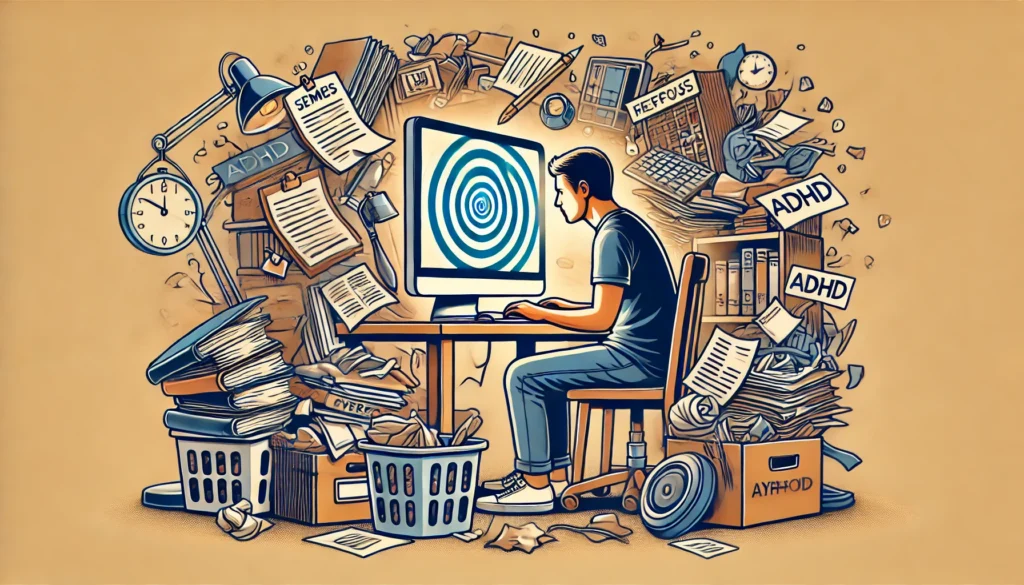The concept of neurodivergence encompasses a range of neurological variations, including ADHD. While the hallmark symptoms of ADHD are well-documented, there are myriad other manifestations that can perplex both patients and practitioners. Understanding these symptoms can aid in accurate diagnosis and effective management.
You may also like: Enhancing Concentration: Strategies for ADHD
Emotional Dysregulation
Emotional dysregulation is one of the more obscure aspects of ADHD. Individuals with ADHD often experience intense emotions, which can fluctuate rapidly. This symptom can lead to impulsive reactions and mood swings, complicating relationships and daily interactions.
Intensity of Emotions
People with ADHD may experience emotions more intensely than others, which can be overwhelming. This heightened emotional response can cause distress in social situations and strain personal relationships. Understanding this aspect can help in developing strategies to manage these emotions effectively.
Rapid Emotional Shifts
The quick transition from one emotional state to another is another challenge. These rapid shifts can be confusing for both the individual and those around them. Learning to recognize triggers and early signs of emotional changes can be beneficial in managing these shifts.
Impact on Relationships
Emotional dysregulation can heavily impact relationships, leading to misunderstandings and conflicts. Developing communication strategies and seeking support from mental health professionals can be pivotal in navigating these complexities.
Time Perception and Management
A less recognized symptom of ADHD is the distortion of time perception, often referred to as “time blindness.” People with ADHD may struggle with estimating how long tasks will take, leading to chronic lateness or the tendency to procrastinate until the last minute. This symptom can be particularly frustrating in professional and personal contexts.
Time Blindness
Time blindness is the inability to perceive the passage of time accurately. This can result in difficulty managing deadlines and appointments, often leading to stress and anxiety. Strategies such as setting timers and using visual schedules can be helpful.
Procrastination Patterns
Procrastination is common among individuals with ADHD due to challenges in initiating and completing tasks. Understanding the root causes of procrastination can help in developing effective intervention techniques, such as breaking tasks into smaller, manageable parts.
Impact on Daily Life
The inability to manage time effectively can lead to complications in everyday life. From missing appointments to incomplete tasks, this symptom can be disruptive. Implementing structured routines and utilizing technology like reminder apps can improve time management skills.
Weird ADHD Symptoms and Their Implications
While hyperactivity and inattentiveness are well-known, other symptoms can be equally disruptive yet remain under the radar.
Sensory Overload
Individuals with ADHD might experience heightened sensitivity to sensory stimuli, such as loud noises, bright lights, or strong smells. This sensory overload can lead to feelings of overwhelm and anxiety, making it difficult to concentrate in busy environments.
Auditory Sensitivity
Loud noises and chaotic environments can be particularly distressing for those with ADHD. This auditory sensitivity can lead to avoidance of crowded places or difficulty focusing in noisy settings. Identifying quieter environments or using earplugs may offer relief.
Visual and Olfactory Sensitivities
Bright lights and strong smells can also trigger sensory overload. These sensitivities can affect one’s ability to work in certain environments. Adjusting lighting or using air purifiers can help mitigate these effects.
Strategies for Coping
Developing coping mechanisms is crucial for managing sensory overload. Techniques such as deep breathing, mindfulness, or seeking quiet spaces can help reduce sensory stress. Occupational therapy may also provide personalized strategies to manage these symptoms.
Hyperfocus
Conversely, hyperfocus is a paradoxical symptom where individuals become so engrossed in a task that they lose track of time and surroundings. While this can be advantageous for productivity, it often leads to neglect of other responsibilities and self-care.
Benefits of Hyperfocus
Hyperfocus can lead to exceptional productivity and creativity when channeled effectively. It allows individuals to delve deeply into tasks, often yielding high-quality results. Recognizing and leveraging these periods can be advantageous in work or academic settings.
Challenges of Hyperfocus
Despite its benefits, hyperfocus can result in the neglect of other tasks or personal needs. It can lead to an imbalance in daily life, where important responsibilities are overlooked. Developing awareness of hyperfocus triggers can help in managing time more effectively.
Balancing Tasks
Finding a balance between hyperfocus and other responsibilities is key. Setting alarms or reminders can help in shifting focus when needed. Practicing self-care and taking regular breaks can also ensure that other aspects of life are not neglected.
Rejection Sensitivity
Rejection Sensitive Dysphoria (RSD) is a lesser-known symptom characterized by an extreme emotional response to perceived rejection or criticism. This sensitivity can result in avoidance of social situations and heightened anxiety, impacting self-esteem and mental health.
Understanding RSD
Rejection Sensitive Dysphoria involves intense emotional pain from perceived rejection. This can result in overreacting to minor criticisms or misunderstandings. Recognizing RSD can be the first step toward developing healthier coping strategies.
Social Implications
The fear of rejection can lead individuals to avoid social interactions, impacting relationships and social life. Building a supportive network and engaging in social skills training can help mitigate these effects.
Coping Strategies
Developing coping mechanisms is essential for managing RSD. Techniques such as cognitive-behavioral therapy (CBT) and mindfulness can aid in reducing sensitivity to rejection. Seeking support from mental health professionals can also provide valuable guidance.

Lesser Known Symptoms of ADHD in Everyday Life
Sleep Disturbances
Sleep issues are prevalent among individuals with ADHD. They may have trouble falling asleep due to racing thoughts or experience restless sleep patterns. This can exacerbate daytime fatigue and impact cognitive functioning.
Difficulty Falling Asleep
Racing thoughts and restlessness often make it hard for individuals with ADHD to fall asleep. Developing a calming bedtime routine can help ease the transition to sleep. Techniques such as reading or practicing relaxation exercises may also be beneficial.
Restless Sleep Patterns
Even when asleep, individuals with ADHD may experience restless sleep. This can result in frequent awakenings and poor sleep quality. Ensuring a comfortable sleep environment and maintaining a consistent sleep schedule can improve restfulness.
Impact on Daytime Functioning
Poor sleep can significantly affect daytime functioning, leading to fatigue and reduced cognitive performance. Addressing sleep disturbances through lifestyle changes and, if needed, medical intervention can enhance overall well-being.
Executive Dysfunction
Executive dysfunction involves difficulties with planning, organizing, and executing tasks. This symptom often manifests in forgetfulness, misplacing items, and an inability to prioritize effectively.
Planning Challenges
Individuals with ADHD may find it challenging to plan and organize tasks. This can lead to missed deadlines and incomplete projects. Utilizing planning tools, such as calendars and to-do lists, can aid in improving organizational skills.
Forgetfulness and Misplacement
Frequent forgetfulness and misplacing items are common manifestations of executive dysfunction. Implementing systems for organization, like designated places for items and checklists, can help mitigate these issues.
Prioritization Difficulties
Prioritizing tasks can be particularly challenging, leading to procrastination or incomplete tasks. Learning prioritization techniques and breaking tasks into smaller steps can enhance task management.
Poor Working Memory
Working memory deficits are another aspect of ADHD that is not immediately obvious. Individuals may struggle to retain and manipulate information over short periods, affecting their ability to follow instructions or complete tasks that require multiple steps.
Short-Term Retention Issues
Difficulties with working memory can lead to problems in retaining short-term information. This can impact academic or work performance. Strategies such as using mnemonic devices or taking notes can assist in memory retention.
Impact on Task Completion
Working memory deficits can hinder the ability to complete tasks that require multiple steps. Developing step-by-step plans or utilizing visual aids can facilitate task completion.
Strategies for Improvement
Improving working memory involves practice and the use of cognitive exercises. Engaging in activities that challenge memory, such as puzzles or memory games, can enhance this cognitive function over time.

Historical Context and Current Trends
The understanding of ADHD has evolved significantly over the years. Initially, ADHD was primarily associated with hyperactive children, but research has expanded the scope to include adults and recognize the diverse symptomatology. Today, there is a growing awareness of the neurodivergent nature of ADHD, leading to more inclusive diagnostic criteria and personalized treatment approaches.
Diagnostic Challenges
Despite advancements, diagnosing ADHD remains challenging due to the variability of symptoms and their overlap with other conditions, such as anxiety and depression. This underscores the importance of comprehensive assessments and individualized care plans.
Overlapping Conditions
ADHD symptoms often overlap with other mental health conditions, complicating diagnosis. A thorough evaluation by a professional can help differentiate ADHD from similar disorders. This process ensures that individuals receive appropriate treatment.
Comprehensive Assessments
A comprehensive assessment involves a detailed exploration of symptoms, history, and behavior. This may include interviews, questionnaires, and observational studies. Such assessments are crucial for an accurate diagnosis and effective treatment planning.
Importance of Individualized Care
Each individual’s experience with ADHD is unique, necessitating personalized care plans. Tailoring treatment to address specific symptoms and challenges can lead to more effective management. Collaboration between healthcare providers and patients is key to developing these plans.
Treatment and Management
Current trends in ADHD management emphasize a combination of medication, behavioral therapy, and lifestyle modifications. For those seeking alternative approaches, biohacking techniques and nootropics are gaining interest as adjunctive strategies to enhance cognitive performance and emotional regulation.
Medication Options
Medications, such as stimulants and non-stimulants, are commonly prescribed to manage ADHD symptoms. These can help improve focus and reduce impulsivity. Regular monitoring by healthcare providers is essential to ensure efficacy and minimize side effects.
Behavioral Therapies
Behavioral therapies, including cognitive-behavioral therapy (CBT), are effective in addressing ADHD symptoms. These therapies focus on developing coping strategies and modifying behaviors. Engaging in therapy can lead to long-term improvements in managing symptoms.
Lifestyle Modifications
Lifestyle changes, such as regular exercise and a balanced diet, play a crucial role in managing ADHD. Incorporating these habits can enhance overall well-being and reduce symptom severity. Additionally, mindfulness and relaxation techniques can support emotional regulation.

Future Implications
Advancements in Brain Science
Ongoing research in neuroscience holds promise for unraveling the complexities of ADHD. Understanding the underlying neural mechanisms may lead to more targeted therapies and interventions, improving outcomes for those affected.
Neuroimaging Studies
Neuroimaging studies are providing insights into the structural and functional differences in the brains of individuals with ADHD. These findings are paving the way for more precise diagnostic tools and targeted treatments. Continued research in this area holds great potential.
Genetic Research
Genetic studies are exploring the hereditary aspects of ADHD, identifying genes that may contribute to the disorder. Understanding genetic influences can lead to personalized medicine approaches, tailoring treatments based on an individual’s genetic profile.
Innovative Therapies
Emerging therapies, such as neurofeedback and brain stimulation techniques, are being investigated for their potential to manage ADHD symptoms. These innovative approaches aim to enhance brain function and improve symptom control.
Personalized Medicine
The future of ADHD treatment lies in personalized medicine, where interventions are tailored to the individual’s unique genetic, environmental, and lifestyle factors. This approach aims to optimize treatment efficacy and minimize side effects.
Tailored Interventions
Personalized medicine involves creating treatment plans that consider an individual’s genetic makeup and environmental influences. This ensures that interventions are effective and well-tolerated. Such approaches are becoming increasingly feasible with advancements in technology.
Role of Technology
Technology is playing a significant role in the personalization of ADHD treatment. Tools like digital health platforms and wearable devices are providing real-time data to inform treatment decisions. These innovations are enhancing the precision of care.
Potential Challenges
While personalized medicine offers many benefits, challenges such as accessibility and cost need to be addressed. Ensuring equitable access to these advanced treatments is essential for widespread implementation.
Practical Advice for Managing Uncommon ADHD Symptoms
Mindfulness and Meditation
Mindfulness practices can help individuals with ADHD develop greater awareness and control over their thoughts and emotions, reducing stress and improving focus.
Benefits of Mindfulness
Mindfulness involves paying attention to the present moment, which can enhance focus and reduce anxiety. It helps individuals with ADHD become more aware of their thoughts and emotions, allowing for better self-regulation. Regular practice can lead to lasting improvements in symptom management.
Incorporating Meditation
Meditation is a key component of mindfulness practices. Short, daily meditation sessions can improve concentration and emotional regulation. Guided meditations are a great starting point for beginners, offering structured support in cultivating mindfulness.
Overcoming Challenges
While mindfulness and meditation can be beneficial, individuals with ADHD may initially find it challenging to focus during practice. Starting with short sessions and gradually increasing duration can help build comfort and consistency. Patience and persistence are key to reaping the benefits.
Structured Routines
Establishing consistent daily routines can alleviate the challenges of time management and executive dysfunction. Utilizing tools like planners and reminders can support organization and task completion.
Importance of Routine
A structured routine provides predictability and stability, reducing uncertainty and stress. For individuals with ADHD, this can lead to improved time management and task completion. Consistent routines create a framework for effectively managing daily responsibilities.
Using Planning Tools
Planning tools, such as digital apps or traditional planners, are invaluable for organizing tasks and appointments. These tools help prioritize tasks and set reminders for important deadlines. Regularly updating and reviewing plans ensures that nothing is overlooked.
Adapting Routines
Flexibility in routines is important to accommodate unexpected changes. Being adaptable allows individuals to adjust their schedules without becoming overwhelmed. Finding a balance between structure and flexibility can enhance overall productivity and well-being.
Sensory Modulation Techniques
For those experiencing sensory overload, sensory modulation techniques, such as noise-canceling headphones or weighted blankets, can provide relief and enhance comfort.
Noise Reduction Tools
Noise-canceling headphones are effective in minimizing auditory distractions, creating a quieter environment conducive to concentration. These tools are especially beneficial in busy settings or during tasks requiring focus. Investing in quality headphones can significantly reduce sensory stress.
Tactile Comfort
Weighted blankets provide deep pressure stimulation, promoting relaxation and reducing anxiety. They can be particularly soothing for individuals with ADHD who experience sensory overload. Incorporating weighted blankets into bedtime routines can improve sleep quality and relaxation.
Creating a Sensory-Friendly Environment
Modifying the environment to reduce sensory input can enhance comfort. This may involve adjusting lighting, minimizing clutter, or using calming scents. Creating a sensory-friendly space helps individuals with ADHD feel more at ease and focused.
Conclusion
ADHD is a multifaceted disorder with a spectrum of symptoms that extend beyond the commonly recognized traits of hyperactivity and inattention. By shedding light on these uncommon symptoms, we can foster a deeper understanding and appreciation for the neurodivergent experiences of those with ADHD. Whether you are a health and wellness coach, science journalist, or biohacker, this knowledge equips you to offer more nuanced support and advocacy for individuals navigating the complexities of ADHD.
Further Reading:
18 Symptoms That Could Indicate Adult ADHD
12 (Surprising) Lesser-Known Symptoms of ADHD
Attention-Deficit / Hyperactivity Disorder (ADHD) in Children
Important Note: The information contained in this article is for general informational purposes only, and should not be construed as health or medical advice, nor is it intended to diagnose, prevent, treat, or cure any disease or health condition. Before embarking on any diet, fitness regimen, or program of nutritional supplementation, it is advisable to consult your healthcare professional in order to determine its safety and probable efficacy in terms of your individual state of health.
Regarding Nutritional Supplements Or Other Non-Prescription Health Products: If any nutritional supplements or other non-prescription health products are mentioned in the foregoing article, any claims or statements made about them have not been evaluated by the U.S. Food and Drug Administration, and such nutritional supplements or other health products are not intended to diagnose, treat, cure, or prevent any disease.


